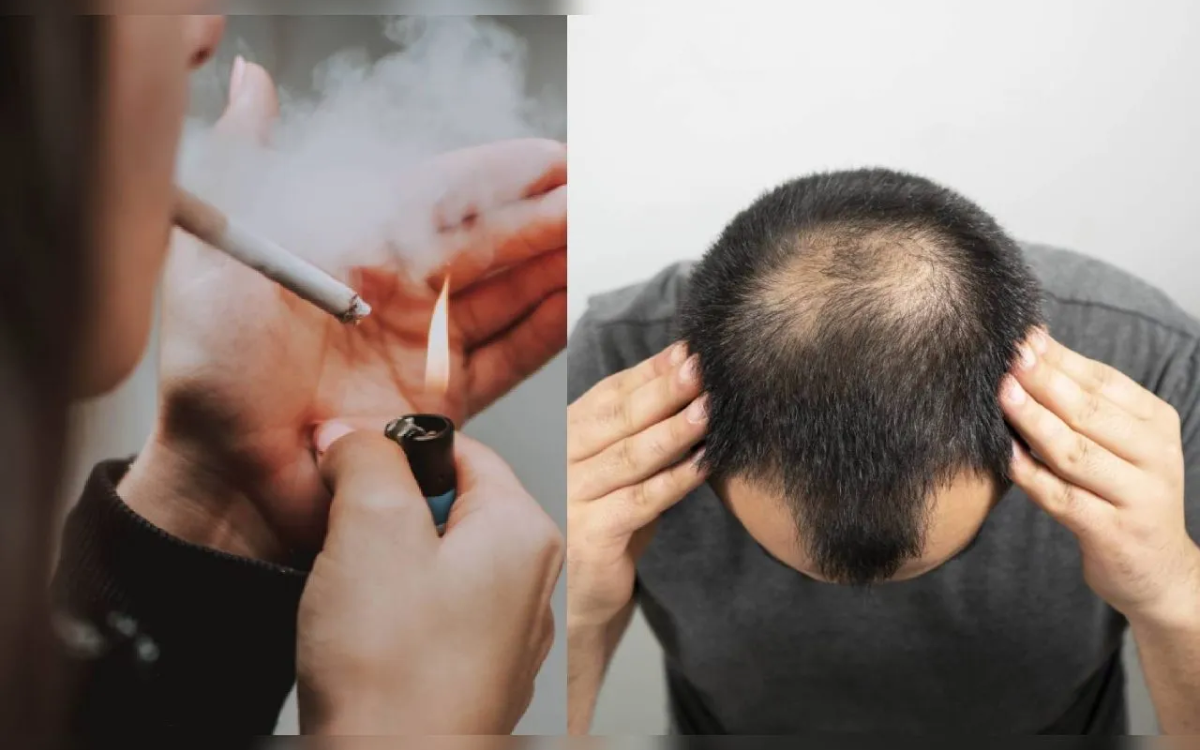Going, going, gone is the reality of thinning hair as you age. You could notice that your formerly thick hair is gradually thinning until you eventually start to see bald areas. Additionally, there may be a connection between hair loss and smoking if you are a smoker. As you are well aware, smoking increases the risk of heart disease, lung cancer, vascular disease, and premature aging of the skin. That alone should be motivation enough to quit, but did you also know that smoking may result in hair loss? To learn how smoking affects hair loss and early graying, keep reading.
Is hair loss caused by smoking?
Stress, heredity, and hormones like DHT are some of the causes of hair loss, but lifestyle choices like smoking cigarettes may also be detrimental to the health of your hair. The proper development of hair depends on blood flow to the hair follicles, which are small pores or holes in your skin that form hair. Nicotine has been found to decrease blood flow while restricting your blood vessels throughout the body.
Because the follicles don’t obtain enough oxygen and nutrients to support a healthy development cycle, restricted blood flow over the scalp may have a detrimental effect on hair growth. In one research, 740 Taiwanese males between the ages of 40 and 91 were examined. The results were reported in the Archives of Dermatology. Despite a family history of smoking, it was shown that those who smoked 20 or more cigarettes per day had a double the risk of experiencing hair loss as compared to people who never smoked. What Causes Hair Loss From Smoking?
Reduced blood flow
To grow healthy hair, your follicles need an abundance of minerals, nutrients, and oxygen. The chemicals included in cigarettes may impair blood flow, cause blood vessels to constrict, and disrupt your circulation. The development cycle of your hair goes through four stages: the growing stage, the transitional stage, the resting stage, and the shedding stage.
Your follicles get agitated and go into a protracted or permanent resting period if you don’t get adequate nutrients. As a consequence, the rate of strand loss remains constant, but the follicles are unable to replenish them. Hair loss arises from a disruption in the hair cycle caused by insufficient blood supply for nutrient delivery.
An Immune System that is Weak
Smoking reduces your immune system’s reaction, which leaves you more susceptible to illnesses. Because of your smoking habit, you could still have that cold you can’t seem to get rid of. Your immune system defends you against illnesses and infections including cancer and the common flu. Your white blood cells are always working to counter the harm that smoking causes. When your immune system is compromised, you are more likely to get bacterial or fungal infections on your scalp, which will stop your hair follicles from growing new, healthy hair.
Environmental Elements
Environmental factors might also cause your hair to become thinner. Your hair loses the protein that powers follicle-based hair growth due to pollution. Pollutants and cancer-causing agents in the air may even make hereditary hair loss worse.
Stress It’s true what you may have heard: stress may cause hair loss. Smoking makes your body more stressed. Additionally, it raises heart rate, blood pressure, and tense muscles. Because withdrawal symptoms start to manifest in your body, nicotine cravings may be distressing.
Smoking Interrupts The System of Hormones
Smoking may damage the endocrine system of the body, which might lead to greater amounts of DHT, the hormone responsible for male pattern baldness.
The follicles might get so small from DHT that they cease growing hair. Additionally, it might result in follicles producing fragile, brittle hair, giving the appearance that your hair is thinner.
Does Smoking Cessation Promote Hair Growth?
Quitting smoking is the greatest approach to undo the harm that smoking has done to your hair. The good news is that hair loss brought on by smoking is curable and reversible after all toxins have been removed from your body. When you stop, your body begins to repair and operate properly, and your hair comes back.
Long-term smokers, however, may need further care to promote hair regeneration, such as a graft or hair transplant. Your general health and the condition of your hair will both improve after you stop smoking. Quitting smoking can prevent premature aging and drying of your scalp, which will lessen the probability of fallout if smoking was the main cause of your hair loss. While smoking has already done harm that cannot be undone, giving up smoking is one approach to get your body back to a place where healthy hair may grow again.
It takes time for hair to mend and get back to being healthy. So, particularly if you’ve been a smoker for a while, have patience. It’s important to consider alternative options and take care of them if you continue to have hair loss after quitting for a while. A licensed expert can point you in the proper way. You desire a 100% success rate if you choose to undergo hair transplant surgery. Smoking should be avoided for at least a week before to the procedure and for two weeks after hair transplantation for optimal outcomes.
Because open wounds are more prone to infection, the risk of infection increases as the wounds take longer to heal. A successful hair transplant may be threatened by infections because there is a potential that scabs and crusts may stay on the skin longer than required, leading to the creation of scar tissue. Hair loss may occur for a number of causes, many of which are connected. Include healthy habits like consistent exercise and a well-balanced diet in your daily routines if you suffer from hair loss, thinning, or premature greying. Do not smoke to mark important moments in your life.

Leave a Reply